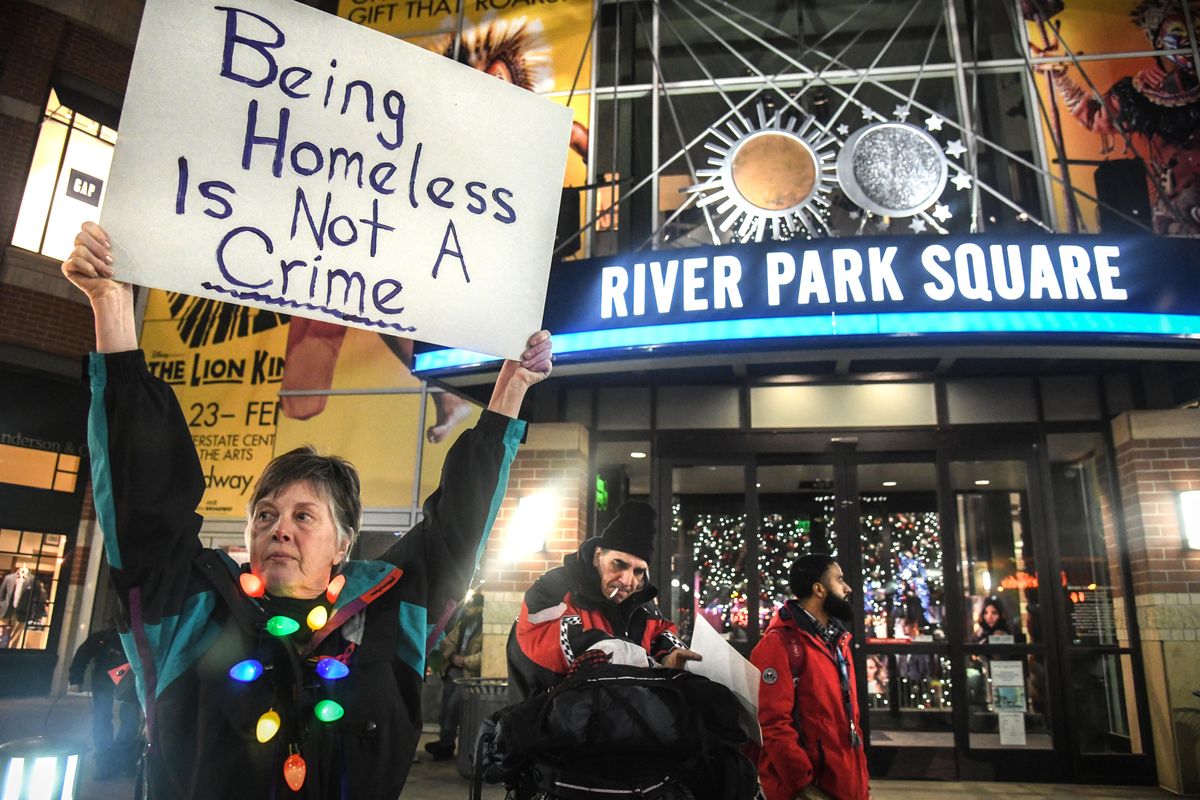‘Seattle is Dying’ report prompts political response to homelessness in Spokane
Deb Maier holds a sign during a protest against the city’s policies toward the homeless population in December 2018. A recent broadcast news story suggesting Seattle is “dying” because of its issues surrounding visible, chronic homelessness has prompted a strong political reaction in Spokane. (Dan Pelle / The Spokesman-Review)Buy a print of this photo
The ripples of a divisive broadcast story from Seattle, suggesting the city is “dying” due to rampant visible homelessness, fueled by drug addiction, have reached Spokane.
KOMO-TV’s “Seattle is Dying” report is a 60-minute look at homelessness that concludes lax enforcement of the law in the city is the culprit for increasing property crime and unsafe public spaces. It has drawn impassioned responses along the political spectrum, particularly from likely Spokane mayoral candidates in this year’s city elections.
That includes KXLY news anchor Nadine Woodward, who is considering a run for mayor and praised the story in a tweet, suggesting there were comparisons to be made to Spokane. City Council President Ben Stuckart, already a candidate for mayor, issued a stern rebuke to the report last week from the Spokane City Council dais. The county’s top law enforcement officer, who isn’t running for mayor, also is highlighting the report.
“It definitely has struck a nerve here,” Spokane County Sheriff Ozzie Knezovich said on Thursday, shortly after featuring the TV spot heavily in his weekly radio show. “You have the same undertones that you have in Seattle, you know, with the citizens, and the mom-and-pop property owners, the business owners. They’re frustrated and they’re angry.”
A different kind of anger was present from Stuckart on Monday night, when he dismissed the piece as exploitative of Seattle’s homeless population and overly simplistic.
“It makes some really harmful generalizations, and it just looks at the consequences of homelessness,” Stuckart said in an interview last week. “It doesn’t talk about solutions, and the specific reasons people are homeless.”
Stuckart noted that the piece was produced and aired by a Seattle affiliate owned by the Sinclair Broadcasting Group, a media company that created controversy in 2018 for requiring its local stations to air a promotional segment critical of “fake news” and adopting right-wing talking points in its stories.
Social media has served as an amplifier of the questions raised by the piece. Knezovich said he instructed his department to post the piece to its Facebook page, where it had received 52 comments and been shared more than 140 times as of Thursday, much more than the typical post on the department’s profile.
“There’s a lot of people out there that are on the liberal side that are calling it propaganda, a lot of people on the conservative side defending it,” said Shawn Poole, a veteran firefighter running against Stuckart and several others for Spokane mayor. “I’ve seen it for 26 1/2 years. I view ‘Seattle is Dying’ as an unadulterated, intrinsic look at what’s going on in the homeless and transient community.”
Other candidates for Spokane’s top executive office (and some rumored as potential officeholders) have weighed in as well. Kelly Cruz, a former member of the West Central Neighborhood Council who announced his candidacy in December, told council members Monday night that the issue was becoming too big to ignore.
“While being homeless is not a crime, neither is it a license to behave criminally in our community,” Cruz said, before referencing the recent decision by the downtown Spokane library to install blue lights in the bathroom to discourage intravenous drug use.
Knezovich argues that many policies pushed by Spokane city leaders don’t provide incentives to homeless people to work their way out of homelessness.
“The whole gamut is skewed not to help the person, but to keep that person in the situation,” he said.
Poole pointed to city discussions about the law that prohibit people from loitering on public sidewalks as evidence that Spokane is pursuing the same philosophies he said had failed in Seattle.
“Their solution to it was the same,” Poole said. “They’re talking about potentially getting rid of the sit-lie ordinance.
“At one point in time in Seattle’s past, they were at a point where we’re at now,” said Poole, a belief that was shared with council members Monday as they considered an ordinance to codify City Hall access to the public.
Despite pressure from activists for the homeless population, the City Council has not repealed its sit-lie ordinance, though it was suspended this winter while funding was made available for multiple warming shelters. The council also passed a law last summer that outlawed camping on public property, though the law would not be enforced when shelter beds were full.
Stuckart’s criticism of the KOMO news story was shared by Andy Rathbun, another candidate for the mayor’s office this November.
“It’s a little bit of scare tactics,” the West Central resident said in an interview last week. “There’s a lot of things it doesn’t address.”
Rathbun said he suspects the issues many West Coast cities are facing were caused by the economic downturn of 2008 and exacerbated by actions of pharmaceutical companies in producing opioids. But he said he believed much of the homelessness in town was caused by drug addiction that needed to be addressed.
“They’re infringing on the rest of society’s rights,” Rathbun said. “The good, hardworking people that are trying to raise their families, they don’t feel safe to go downtown.”
The conversation also has taken hold on social media.
Woodward, the recently retired KXLY television anchor, tweeted a link to the video with the message, “Wake up #Spokane! WE need to do EVERYTHING possible to make sure THIS doesn’t happen HERE.”
Woodward did not return a phone call requesting comment last week.
“The homeless aren’t going to kill Spokane,” wrote back Chris Schroll, another candidate for Spokane mayor. “The segment inaccurately paints all homeless as mentally ill drug addicts, but that’s not the reality.”
State Rep. Matt Shea also posted the story to his Facebook page, suggesting the piece indicated the need for one of his longtime, pipe-dream policy positions: splitting Washington into two states.
“WHAT MANY OF US ALREADY KNEW: Seattle is dying. Another reason for #LibertyState,” Shea wrote.
The segment, produced by KOMO’s Eric Johnson, has had its defenders on the West Side. But there were suggestions Thursday that its presentation of a man in crisis may not have told the whole story. Crosscut, an online, nonprofit news outlet, published an interview with one of the men captured on camera on a public street in the KOMO story who said he wasn’t homeless, and his inability to lift himself to walk was not due to drug addiction, but a physical ailment. Johnson wrote Friday that the man interviewed by Crosscut told his team he was high on drugs at the time of the filming.
Knezovich said he hadn’t seen those reports Thursday, but they didn’t change his mind about the message of the piece.
“That would be outstanding if he was” receiving help, Knezovich said, “but it doesn’t seem to be working if he ends up on camera looking the way he is.”
The sheriff said he endorsed the conclusion of the KOMO piece – that putting those with severe drug and mental health issues into treatment facilities should be the path forward, rather than increasing free housing stock or offering free medical care.
“There is nothing compassionate about locking somebody into this type of lifestyle,” Knezovich said. “To do what we are doing, at the city of Spokane council level are doing, is cruel.”
Stuckart said several people in the community had shared the link with him before the meeting Monday night, and he wasn’t responding to Woodward’s tweet or any other social media message before making his statements about the piece and pushing back against the notion that either Seattle – or Spokane – is “dying.”
“Throwing people in jail is not a solution to homelessness,” Stuckart said. “I think we need to be looking at what are the upstream issues, why is our mental health system not working correctly, and why do we not have enough affordable housing?”


